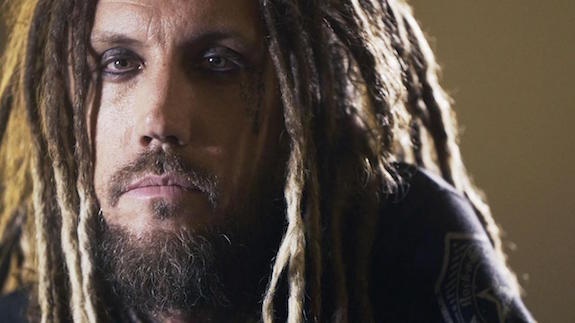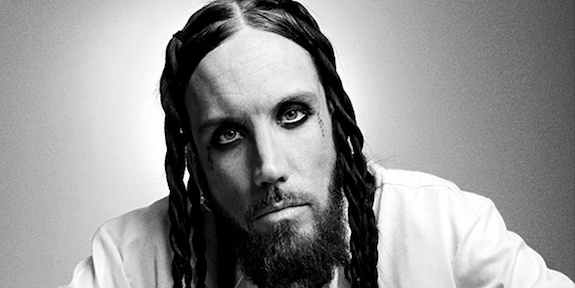SCROLL DOWN FOR ENGLISH VERSION
A distanza di dieci anni, "Save Me From Myself", la tua autobiografia, è stata finalmente tradotta in lingua italiana. Nel frattempo cosa è cambiato nella tua vita artistica e personale?
Tutto è cambiato per me assolutamente in positivo. La mia vita personale è migliorata in maniera straordinaria e ho trovato tanta pace e felicità. Mi diverte molto invecchiare e vedere cosa riserva il futuro. Artisticamente, le cose sono andate avanti in modo incredibile: il ricongiungimento con i Korn, il mio lavoro solista, il mio nuovo film "Loud Krazy Love". Non potevo essere più soddisfatto!
L'aspetto più sorprendente del libro è il forte contrasto tra l'apparente mondo dorato del successo con i Korn e la sofferenza che stavi provando. Posso chiederti se, in questi ultimi anni, ti sei mai pentito di aver lasciato la band? Oggi vedi qualche soluzione alternativa che ti avrebbe dato la possibilità di rimanere nel gruppo?
Beh, sono tornato nei Korn ora, quindi ogni cosa si trova dove dovrebbe. Non ho mai avuto rimpianti per aver lasciato la band durante gli otto anni in cui ero via, ma di certo mi mancavano alcuni aspetti di essa.
Nella tua autobiografia parli dell'uso della metanfetamina e di altre abitudini dannose che ti stavano portando alla distruzione. In che modo scrivere questo libro ha aiutato a ricostruire te stesso?
Mi ha davvero aiutato a condividere i miei profondi e personali fallimenti e a superarli nella mia autobiografia. È stata come una terapia per me. Guardando indietro, vedo che gran parte del libro era incentrato sulla mia confessione e sul mio auto-perdono.
La nascita di tua figlia, Jennea, non ti distolse dal tuo processo autolesionistico. Lei ha già letto il libro? Se è così, posso chiederti se è riuscita a capire meglio grazie a quelle pagine quello che hai passato?
Sì, Jennea ha letto il libro e ora ha quasi 20 anni, quindi sicuramente comprende molto meglio oggi alla sua età le trappole in cui l'umanità può cadere. Sfortunatamente, ho portato molto dolore nella sua vita, ma si è ripresa abbastanza bene e per fortuna mi rispetta davvero molto per aver vinto i miei demoni e aver cambiato la mia vita grazie all'amore che nutro per lei.

Tornando ai primi tempi dei Korn, non avevi molti tatuaggi, ma poi, quando diventasti cristiano, ti sentivi come se Dio ti stesse dicendo di utilizzare il tuo corpo quale espressione aggiuntiva della tua fede e così ne hai molti ora. Qual è il più significativo per te? E perché?
Dovrei dire tutto il mio braccio sinistro. Amo l'opera d'arte e sono soprattutto un fan dei tatuaggi neri e grigi. La parte superiore del braccio sinistro ha un ritratto della famosa statua di Gesù a Rio de Janeiro, un ritratto di mia figlia a sei anni sotto di lui, alcune mani in preghiera sulla parte posteriore e un incredibile ritratto dell'album "Untouchables" dei Korn sul mio avambraccio.
Dopo la pubblicazione della biografia, uscì anche un disco con lo stesso titolo. Sentivi la necessità di spiegare la tua riabilitazione anche in musica? E quanto catartico è stato scrivere quell'album?
In realtà composi la canzone "Save Me From Myself" prima di scrivere il libro. Ho scelto il titolo del libro proprio da quella canzone. Queste quattro parole, "Save Me From Myself", sono molto, molto importanti perché hanno un significato incredibilmente profondo per me. La mia intera vita è stata drammaticamente cambiata dall'aver pronunciato quelle quattro parole preziose.
Quanto è difficile conciliare uno stile di vita da rockstar con i principi biblici? Senti qualche conflitto a volte? Se è così, come lo gestisci?
Penso che la maggior parte del mondo abbia opinioni preconcette su quali siano i principi biblici in realtà. Dall'altro lato hai persone troppo religiose (cosa di cui mi sono un po' macchiato in passato) che semplicemente non capiscono il fatto che Gesù Cristo è venuto per iniziare l'ultima festa. Il suo messaggio è noto come "la buona novella". Sì, c'è il sacrificio di sé coinvolto, e sì, è importante deporre le cose e abbandonare la tua vita in modo che Lui possa conquistarti, ma la sola possibilità di un'esperienza profonda all'interno del proprio spirito, anima, mente e corpo in realtà arriva, sul piano concreto, dall'amore di Dio, che non può essere articolato correttamente con il linguaggio umano - o comparato ai livelli distruttivi di questo mondo. Quindi, per rispondere alla tua domanda, no, io non provo alcun conflitto, perché anch'io sto vivendo un piacere profondo, solo in un modo diverso rispetto a altre persone nel mondo del rock che potrebbero trovare piacere in altre sostanze.
Visto il grande successo ottenuto da "Save Me From Myself" il tuo primo libro è diventato un versione per "menti più giovani". Hai mai ricevuto messaggi speciali da qualcuno dei tuoi lettori che sono riusciti a sfruttare al meglio il tuo esempio e trasformare le loro vite in qualcosa meglio?
Sì, ho ascoltato innumerevoli storie e sono così grato che mi sia stata data una seconda possibilità e la capacità di aiutare così tante persone a vedere che la vita può davvero essere sorprendente e rimanere tale.
ENGLISH VERSION
Ten years later, "Save Me From Myself", you autobiography, has finally been translated into Italian. In the meanwhile what has changed in your artistic and personal life?
Absolutely everything has changed for me for the better. My personal life has improved so much and I've found so much peace and contentment in life. I really enjoy getting older and seeing what the future holds. Artistically, things have progressed so much as well with my rejoining Korn, my solo work and my new film "Loud Krazy Love." I couldn't be happier!
The most striking aspect of the book is the strong contrast between the apparent golden world of success with Korn and the suffering you were enduring. May I ask you if, in these latest years, you have ever regretted leaving the band? Why so? Do you see any alternative solution that would have made you stay in the band, today?
Well I am back in Korn now, so everything is where it should be. I didn't ever have regrets for leaving the band during the eight years I was gone, but I did miss aspects of it.
In your autobiography, you talk about the use of methamphetamine and other detrimentalhabits that were going to destroy you. How has writing this book helped you in re-building yourself?
It really helped me by sharing my deep and personal failures and overcoming them in my autobiography. It was like therapy to me. Looking back I can see that much of the book was about my confession and self-forgiveness.
The birth of your daughter, Jennea, didn't distract you from your self-injuring process. Has she read the book already? If so, may I ask you if she managed to better understand what you have been through thanks to those pages?
Yes, Jennea has read the book and she's almost 20 years old now, so she definitelyunderstands the traps that humanity can fall in a lot better today at her age. Unfortunately, I brought much pain into her life, but she's been healed quite a bit and thankfully she's gained a lot of respect for me for overcoming my demons and turning my life around because of my love for her.
Back in the early Korn days, you didn't have many tattoos but then, when you became a Christian, you felt like God was telling you to use your body as an additional expression of your faith and so you have lots of them now. Which one does mean the most to you? Why?
I would have to say my entire left arm. I love the artwork and I am especially a fan of black and gray tattoos. My upper left arm has a portrait of the famous statue of Jesus in Rio de Janeiro, a portrait of my daughter at six-years-old underneath that, some praying hands on the back of the arm, and an incredible portrait of Korn's album "Untouchables" on my forearm.
After the biography was published, a record with the same title was released as well. Was the need to translate your rehabilitation into music too? And how cathartic was writing that album?
I actually wrote the song "Save Me From Myself" before I wrote the book. I chose the book title from that song. Those four words "Save Me From Myself" are very, very important because they have incredibly deep meaning to me. My whole life was dramatically changed from saying those four precious words.
How difficult is it to reconcile a rockstar lifestyle with biblical principles? Do you feel any conflict sometimes? If so, how do you deal with them?
I think most of the world has preconceived opinions about what biblical principles are actually about. On the other hand, you have the overly-religious people (which I am a little bit guilty of in the past) who just flat out don't get the fact that Jesus Christ came to start the ultimate party. His message is famously called "the good news." Yes, there is self-sacrifice involved, and yes, it's important to lay things down and surrender your life so He can take over, but the freedom one will experience deep inside their spirit, soul, mind and body actually comes with a tangible high from God's love that cannot be articulated correctly with the human language-or compared to the destructive highs of this world. So to answer your question, no, I don't feel conflict at all, because I'm living in deep pleasure as well, just in a different way than other people in the rock world who may find pleasure in substances.
Given the great success achieved by "Save Me From Myself" your first book was turned into a version for "younger minds" as well. Have you ever received any special message from any of your readers who managed to make the most of your example and turn their lives into something better?
Yes, I have heard countless stories and I'm so grateful that I've been given a second chance and able to help so many people see that life really can be amazing and stay that way.



